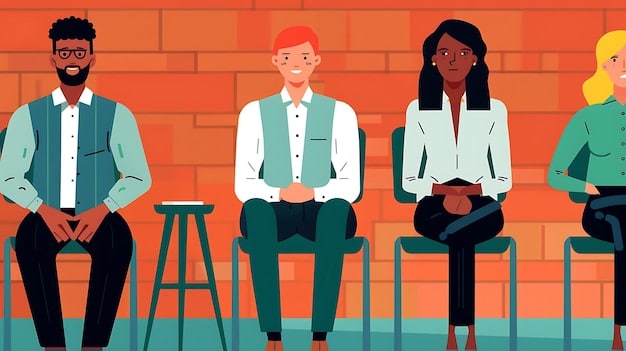Ace Your College Interviews: Proven Strategies for Success

Ace Your College Interviews: Proven Strategies for Success involves meticulous preparation, understanding common questions, practicing responses using the STAR method, dressing professionally, and demonstrating genuine enthusiasm for the institution to make a lasting positive impression.
College interviews can be daunting, but they are a crucial step in the admissions process. Mastering the art of the college interview, or Ace Your College Interviews: Proven Strategies for Success, can significantly increase your chances of acceptance into your dream school. Preparing effectively and knowing what to expect are key.
Understanding the Importance of College Interviews
College interviews offer a unique opportunity for admissions committees to learn more about you beyond your application. They allow you to showcase your personality, communication skills, and genuine interest in the college.
Why are these interviews so vital? Here are some critical reasons:
Demonstrating Your Personality
Interviews provide a platform to convey your character and enthusiasm, which written applications can’t fully capture.
Highlighting Fit
Colleges want to see how well you align with their values and community. The interview offers a way to demonstrate this.
Addressing Concerns
If there are any gaps or inconsistencies in your application, an interview provides an opportunity to clarify them.
- Show Enthusiasm: Express your genuine interest and passion for the college.
- Clarify Aspects: Use the interview to elaborate on your achievements and why you are a good fit.
- Make a Connection: Build a rapport with the interviewer to make a lasting impression.
Ultimately, understanding the significance of college interviews can help you approach them with the right mindset and strategies.
Preparing Before the Interview
Effective preparation is paramount to a successful college interview. This involves researching the college, understanding common interview questions, and practicing your responses.
Here’s how to prepare:
Researching the College
Thoroughly research the college’s mission, values, programs, and campus culture to show your genuine interest and knowledge.
Anticipating Common Questions
Brainstorm answers to standard interview questions such as “Why do you want to attend this college?” and “What are your strengths and weaknesses?”
Practicing Your Responses
Rehearse your answers out loud, either alone or with a friend, to improve your confidence and delivery. Here are some common questions:
- “Tell me about yourself.”
- “Why are you interested in our college?”
- “What are your strengths and weaknesses?”
- “What are your academic and extracurricular interests?”
Preparation is the cornerstone of a confident and successful interview.

Mastering the STAR Method for Answering Questions
The STAR method is an effective technique for structuring your answers during a college interview. It helps you provide detailed, relevant, and compelling responses.
What is the STAR method?
Situation
Describe the context or background of the situation.
Task
Explain what you needed to achieve.
Action
Detail the steps you took to address the situation.
Result
Share the outcomes and what you learned.
Here’s an example using the STAR method:
Imagine you’re asked, “Tell me about a time you overcame a challenge.”
- Situation: “In my sophomore year, our debate team faced a critical funding shortage.”
- Task: “My role was to organize a fundraising event to secure enough funds for the team to continue competing.”
- Action: “I created a crowdfunding campaign, secured local business sponsorships, and organized a community debate night.”
- Result: “We exceeded our fundraising goal, raising 150% of the needed funds, allowing us to compete and place in the top three at the state tournament.”
Using the STAR method ensures a well-structured and impactful response.
Dressing Appropriately for the Interview
Your attire significantly impacts the first impression you make. Dressing professionally demonstrates respect for the interviewer and the college.
Here are some guidelines:
Business Casual Attire
Opt for business casual attire, such as a button-down shirt, blouse, dress pants, or a knee-length skirt.
Avoid Distractions
Ensure your clothing is clean, wrinkle-free, and fits well. Avoid overly flashy or distracting accessories.
Comfort
Choose comfortable shoes and clothing that allow you to feel confident and at ease.
What to avoid:
- Jeans or T-shirts: These are generally too casual for a college interview.
- Excessive Jewelry: Keep accessories minimal and professional.
- Uncomfortable Clothing: Wear something that allows you to focus on the interview, not your discomfort.
Your clothing should complement your words and show that you take the interview seriously.
During the Interview: Tips for Success
During the interview, focus on making a positive impression through your demeanor, communication, and engagement. Project confidence and enthusiasm.
What should you do during the interview?
Body Language
Maintain eye contact, sit up straight, and smile to convey confidence and engagement.
Active Listening
Listen attentively to the interviewer’s questions and respond thoughtfully and directly.
Engaging Questions
Prepare thoughtful questions to ask the interviewer, demonstrating your interest and initiative. Here are some examples:
- “What unique opportunities does the college offer for undergraduates?”
- “How does the college support students’ academic and personal growth?”
- “What is the most rewarding aspect of being a member of this college community?”

Engaging effectively during the interview can significantly enhance your chances of making a lasting positive impression.
Following Up After the Interview
Sending a thank-you note after your interview is a courteous and professional gesture. It reinforces your interest in the college and allows you to reiterate your key strengths.
Why send a thank-you note?
Expressing Gratitude
Acknowledge the interviewer’s time and consideration, demonstrating politeness and respect.
Reinforcing Interest
Reiterate your enthusiasm and eagerness to join the college community.
Highlighting Key Points
Briefly mention something specific you discussed during the interview to show your engagement and understanding. Here’s what to include:
- Express Appreciation: Thank the interviewer for their time and insights.
- Reaffirm Interest: Clearly state your continued interest in attending the college.
- Reference Specifics: Mention a topic or point that resonated with you during the interview.
Remember, a well-crafted thank-you note can leave a lasting impression.
| Key Point | Brief Description |
|---|---|
| 📚 Preparation | Research the college thoroughly and practice common interview questions. |
| ⭐ STAR Method | Use Situation, Task, Action, Result to structure your answers. |
| 👔 Dress Code | Dress professionally in business casual attire to make a positive first impression. |
| ✉️ Follow-Up | Send a thank-you note to reinforce your interest and gratitude. |
What are college interviewers looking for?
▼
Interviewers seek candidates who demonstrate genuine enthusiasm, clear communication skills, a strong fit with the college’s values, and the ability to articulate their goals and experiences effectively.
▼
Practice relaxation techniques like deep breathing, visualize success, and remember that the interviewer wants you to succeed. Preparation and positive self-talk can significantly reduce anxiety.
▼
It’s okay to admit you don’t know the answer. Offer a thoughtful response based on related knowledge or ask for clarification to better understand the question.
▼
Authenticity is crucial. Be genuine and let your personality shine through. Admissions committees want to get to know the real you, not a fabricated persona.
▼
Avoid providing generic answers, failing to research the college, dressing inappropriately, displaying arrogance, or forgetting to ask questions. Preparation and mindfulness can prevent these errors.
Conclusion
Mastering your college interviews requires diligent preparation, effective communication strategies, and a genuine display of enthusiasm and interest. By implementing these proven techniques, you can confidently approach your interviews and significantly increase your chances of acceptance into your desired institution.
content





